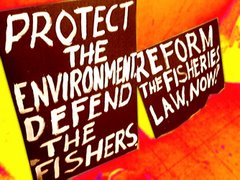
(An excerpt from Ms. Kareen Kristeen Valmoria's paper on FIDEC)
SUMMARY
In a region that straddles four major fishing grounds in the Visayas (Tanon Strait, Cebu Strait, Camotes Sea and Bohol Sea, the existence of FIDEC-CV in the last 22 years has proven to be invaluable not only to the fisherfolk but also for the broader segment of the population. Not only has the NGO been able to effectively campaign for the rights of the fisherfolk to their livelihood and for protection of the local marine resources and ecology, it has also managed to educate other sectors and united them with the fisherfolk on and beyond local social and environmental issues.
The long history of successful campaigns and projects is particularly attributable to comprehensive social investigation and study of the sector being serviced, establishment of highly-organized and independent fisherfolk organizations capable of managing local projects and campaigns, and a clear direction that unifies all programs and projects. This is most embodied in FIDEC-CV’s mission for a fisherfolk sector that is empowered to defend their rights and work around the objective of sustainable development.
In its latest campaign against offshore mining, this thrust towards sustainable development particularly stands out. Beyond demanding the immediate recourse to fisherfolk whose livelihood is heavily affected through financial assistance and subsidies, FIDEC-CV has united broader sections of society in the fight against long-term ecological damage to Tanon Strait and nearby bodies of water which are also being targeted for oil exploration and offshore mining.
However, because of the particular characteristics of the Philippine economic and political structure, the NGO also has an equally long experience with harassment from the state’s agents and armed forces.
The red-scare tactics (labeling as communist) has often proved to make the work of area organizers and coordinators more difficult. Conservative sections easily get intimidated especially because people peddling this black propaganda are police and military agents or assets.
This does not shut down or discourage the staff and organizers of FIDEC though. It’s record of enduring through 22 years of painstaking advocacy work among the fisherfolk is notable.
CONCLUSIONS AND RECOMMENDATIONS
The Philippines purportedly has the “largest NGO density” in the entire world (Hilhorst, 2003). According to the Securities and Exchange Commission, from 23,800 in 1984, the number of NGO’s rose to 70,200 in 1995. However these figures include those that do not engage in development work. In 1995, when the Caucus of Development NGO Networks (CODE-NGO), the largest NGO alliance in the country, made a survey and counted 7,000 NGO’s all over the country. This does not even take into account the thousands of people’s organizations (PO’s) which form the social networks that the NGO’s work with.
FIDEC-CV is one of these NGO’s and, as its contemporaries have, has moved into development work that is directed towards sustainable development for its beneficiary sector. According to Broad and Cavanagh in a study they conducted on Philippine NGO’s in 1993, most NGO’s in the Philippines define their vision for equitable and sustainable development as an “environmental movement that is a struggle for equity in the control and management of natural resources”. This is because the Philippine model for development is one that is rooted in inequality, with the perpetrating enterprises and individuals having strong political and military connections. For FIDEC-CV, this includes the large commercial fishing enterprises, tourism projects, and lately foreign oil and petroleum companies.
In Central Visayas, as well as the rest of the Philippines, environmentalist agenda is always a political agenda for this reason. The marginalized sectors, in this case the fisherfolk, face opponents holding enough power to ignore or bypass laws or even twist them according to their whims. In order to effectively engage them, NGO’s in development work should always have as its closest allies the peoples’ organizations (PO’s). Throughout the long history of FIDEC-CV, it has always upheld that sustainable development is a participatory development. As is obvious by now, NGO work in this country ultimately illustrates the situation that a class society is daily mired in: a struggle for better access to wealth, power, and prestige.
According to Dutch researcher Dorothea Hilhorst in her book ‘The Real World of NGO’s’ (2003, Ateneo de Manila University Press), the arena of NGO’s in development work has been traditionally held by the Philippine left since the Martial Law years and in fact many of the NGO leaders and staff went underground at the height of the Philippine communist insurgency in the 1980’s. All throughout the bloody military campaigns that political regimes waged against the insurgency since Aquino’s, NGO’s in development work have been raided and ransacked by state troops, its officers and staff harassed and murdered, and its allied people’s organizations subjected to intensive militarization.
“To become an active environmentalist in the Philippines is to risk one’s life.” (Broad and Cavanagh, 1993). This is because FIDEC-CV and similar NGO’s are challenging the most powerful elements of Philippine society. Groups and individuals who are moved to partner with them are therefore increasingly convinced that to fight for the environment is to fight for basic and democratic rights. This has been put forward many times by development workers and leaders: the struggle for sustainable development in the Philippines is intricately linked with the struggle for peace and human rights.
The communist tag and red scare tactics adopted by the state to stop marginalized communities from forming PO’s and aligning with NGO’s is actually ineffective if countered with sustained education on social and environmental issues. Organizers and staff of FIDEC-CV and other NGO’s in development work must be able to clearly articulate the bigger social picture to the beneficiary communities. They must be able to explain in logical and simple terms how they are inextricably connected to the struggle to protect the environment and similarly to the struggle for peace and human rights.
However, NGO’s must give particular attention to socio-economic projects because beneficiaries, though convinced of the issues at hand, cannot sustain without some form of alleviation to their poor economic power. In large scale campaigns like the one against offshore mining, FIDEC-CV must be able to provide solutions and alternatives to the loss of livelihood. This should not be too hard once it has expanded its influence and alliances to sectors with better access to economic resources. This should be high on the list of the agenda for discussion in its Save The Tanon Strait Citizens’ Movement.
Former development worker and social welfare secretary Dinky Soliman said in an interview with Broad and Cavanagh that a balance should be struck with long-term goals for sustainable development and the here and now. The fisherfolk affected by development projects require immediate assistance.
Area development is a painstaking step-by-step process. We cannot expect the people to be able to take control of local resources without a reaction from the powers-that-be from the bureaucracy and their allied foreign and local capitalist enterprises. Most of FIDEC-CV’s successful campaigns in the last two decades have been, at their best, partial victories. Without extensive and intensive changes in the economic and political structure of the country, all the stumbling blocks in the way of sustainable development will stay in place.
However, as a final note in this research, let me just point out that the Philippine NGO sector has been noted to be one of the most dynamic in the whole world. As FIDEC-CV has proven, it has learned its lessons in development work. As long as this culture for improvement is maintained, through even marginal or partial victories, development work in the Philippines will continue to get closer to its vision of equitable and sustainable development.
As we know, even ecologically-destroyed and depleted seas and rivers can be restored through sustained protection policies and campaigns. One day, the fishermen of Central Visayas will cast their nets and find that they are hauling in victories for themselves and for their nation.
REFERENCES
Broad, Robin and Cavanagh, John. 1993. From Plunder to Sustainability. Plundering Paradise: The Struggle for the Environment in the Philippines. pp. 133-157. Berkeley: University of California Press.
Central Visayas Fisherfolk Development Center. 2007. Documents, including Annual Report, Operations Manual, Brief History of FIDEC, and Student Internship Program.
Cinches, Vince. Powerpoint presention on the Save Tanon Strait Citizens’ Movement at forum in University of San Carlos, Cebu City, March 2008.
Hilhorst, Dorothea. 2003. The Politics of NGO-ing. The Real World of NGOs. pp. 1-27. Ateneo de Manila University Press.
Olofson, Harold and Tiukinhoy, Araceli. 1992. Plain Soldiers: Muro-ami fishing in Cebu. Philippine Studies 40 (1): 35-52.
Seki, Koki. 2004. Maritime Migration in the Visayas: A Case Study of Dalaguetenon Fisherfolk in Cebu. Ateneo de Manila University Press.








